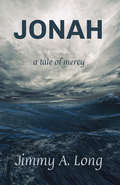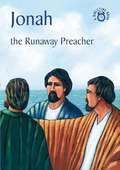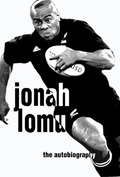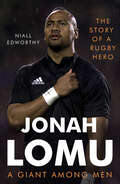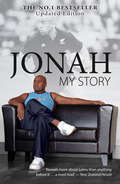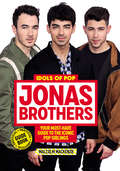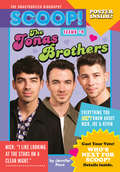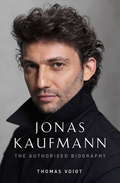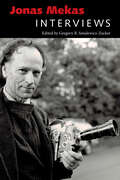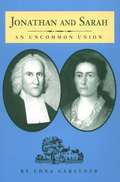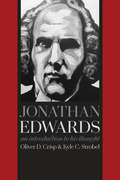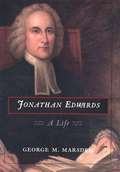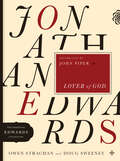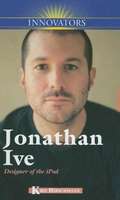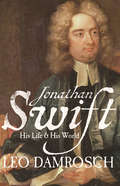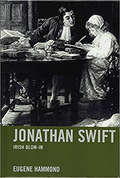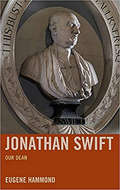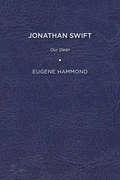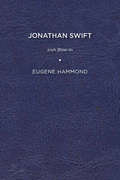- Table View
- List View
Jonah: A Tale of Mercy
by Jimmy A. LongThe story of Jonah is ancient and often told, but even so, most remember it only as the tale of a prophet eaten by a fish. In Jonah: A Story of Mercy, author Jimmy A. Long presents the biblical story of Jonah with historical details of the time while weaving fictional characters and events that present the prophet as a real man fighting the call of God on his life. Beginning prior to his call to Nineveh, we follow Jonah as he runs from God, reluctantly obeys God, and is amazed and even angered at the mercy of God. In the process, we learn as much about ourselves as we do the prophet.
Jonah: The Runaway Preacher
by Carine MackenzieThe story of Jonah is accurately retold from the Bible (From the book of Jonah). The Bibletime series by Carine Mackenzie have been praised for their accurate retelling of great bible stories. This timeless collection has been printed in many languages throughout the world and sold in their millions. They can be read over and over again.
Jonah Lomu Autobiography
by Jonah LomuWhen Jonah Lomu trampled over Tony Underwood in the World Cup semi-final in 1995, the greatest star rugby union has ever seen was launched on the world. His size and pace seemed to make him unstoppable - and he was still just 20, having only recently learned to play on the wing. How much better would he get? But a year later, a rare and serious kidney disorder threatened more than his career. He fought back, and continued to score tries at a remarkable rate.Lomu's astonishing story is not just about tries, but about adapting to becoming rugby's first superstar of the professional era, a life lived in the spotlight. This is an extraordinary tale from an extraordinary man.
Jonah Lomu Autobiography
by Jonah LomuWhen Jonah Lomu trampled over Tony Underwood in the World Cup semi-final in 1995, the greatest star rugby union has ever seen was launched on the world. His size and pace seemed to make him unstoppable - and he was still just 20, having only recently learned to play on the wing. How much better would he get? But a year later, a rare and serious kidney disorder threatened more than his career. He fought back, and continued to score tries at a remarkable rate.Lomu's astonishing story is not just about tries, but about adapting to becoming rugby's first superstar of the professional era, a life lived in the spotlight. This is an extraordinary tale from an extraordinary man.
Jonah Lomu, A Giant Among Men: The Story of a Rugby Hero
by Niall EdworthyA concise biography of Jonah Lomu, the international icon who changed rugbyJonah Lomu, A Giant Among Men profiles New Zealand’s greatest sportsman, and one of the finest players in the history of rugby. His combination of pace and power was unprecedented, enthralling fans from around the world. Lomu burst onto the international scene in 1994, joining the All Blacks as their youngest-ever member. With a string of exceptional performances he came to dominate the Rugby World Cup the following year. His ebullient personality, frightening athleticism and passionate pride in wearing the shirt captured the public imagination, and made Lomu the game’s first truly global superstar.His tragic death in November 2015, aged just 40, left the rugby community in shock. This biography pays tribute to a life cut short, but one marked by such achievement and impact that it will never be forgotten.
Jonah - My Story: My Story
by Warren Adler Jonah LomuHe was rugby?s first truly international celebrity and he remains one of the game?s greatest heroes. A decade after the publication of his blockbuster autobiography, Jonah Lomu opens up like never before about life after the All Blacks. In this deeply moving, sometimes explosive update to Jonah: My Story, the big man talks candidly of his life and his loves, of reconciliation and betrayal, and of the tragic illness that has been the one constant in his life since he first thundered on to the world?s sporting stage. It?s 10 years since he played his final match for the All Blacks, but still Jonah Lomu remains the most recognisable rugby face on the planet. In this much awaited update to his 2004 best-selling biography, Jonah talks about the highs and lows of that last decade with candour and honesty. Packed with astonishing revelations, including the split with his long-time manager, the breakdown of his marriage and the deeply moving reconciliation with his father, Jonah is also open about his on-going health problems. He details his brave battle with nephrotic syndrome, which eventually led to a kidney transplant and talks about his current health situation, which sees him again in complete renal failure and requiring a second transplant. Despite the cruel hand Jonah Lomu has been dealt, he remains cheery and optimistic, sharing the good times along with the bad ? including his joy at becoming a father and how his two young sons have helped save him from the `dark times?.
Jonas Brothers: Your Unofficial Guide to the Iconic Pop Siblings (Idols of Pop)
by Malcolm MackenzieBook two in the Idols of Pop series, Idols of Pop: The Jonas Brothers, is an essential fan-focused guide to the latest and greatest icons in pop music: the Jonas Brothers! This 64-page book features full-color candid and professional photos with the Jonas Brothers front and center. Packed with personal takes on life, love, music and more, Idols of Pop: Jonas Brothers is your guide to one of the hottest pop groups in the world today.
The Jonas Brothers: Issue #4 (Scoop! The Unauthorized Biography #4)
by Jennifer PouxIntroducing a new series of unauthorized biographies on the world's biggest names and rising stars in entertainment, sports, and pop culture! Complete with quizzes, listicles, trivia, and a full-color pull-out poster of the star, this is the definitive collection to get the full Scoop! and more on your favorite celebrities.Nick, Joe, and Kevin. Can you name a more iconic trio? From their early singing days with their mop-top haircuts, to their meteoric rise to superstar status, and then an abrupt breakup in 2013, the Jonas bros are back...and this time they're clean-cut and wifed up. But what's next for the Jonas bros and J sisters? Get the full Scoop! and more on pop's most iconic trio.
Jonas Kaufmann: In Conversation With
by Thomas Voigt'The most sought-after tenor in the world', the greatest tenor of today', 'the new king of tenors' - for years Jonas Kaufmann has occupied a unique status among the world's greatest opera singers.Thomas Voigt's revealing biography, written in collaboration with Kaufmann, reflects on the singer's artistic development in recent years; his work in the recording studio; his relationship to Verdi and Wagner; and much more. The book includes contributions from Plácido Domingo, Anja Harteros, Antonio Pappano, Helmut Deutsch and Jürgen Kesting, as well as many striking photographs.Kaufmann was born in Munich in 1969. Soon after training at the University of Music and Performing Arts he was invited to make his debut in theatres such as the Stuttgart Opera and Hamburg State Opera, as well as international appearances at the Lyric Opera of Chicago, the Paris Opera and La Scala in Milan. He made his Salzburg Festival debut in 1999 in a new production of Busoni's Doktor Faust. He performed the role of Don José in Bizet's Carmen at Covent Garden in 2006 and made his acclaimed debut as Alfredo in Verdi's La Traviata at the Metropolitan Opera alongside Angela Gheorghiu. He has sung leading tenor roles in the operas of Richard Wagner with success in Germany and abroad, and is also a highly accomplished Lieder singer. In 2015 Kaufmann became the first German to perform the British seafaring anthem 'Rule, Britannia!' at the Last Night of the Proms.No wonder that the New York Times has described Jonas Kaufmann as 'a box-office draw, and ... the most important versatile tenor of his generation'.
Jonas Kaufmann: In Conversation With
by Thomas VoigtJonas Kaufmann is a phenomenon. With his musicality, his vocal technique and his expressive powers - to say nothing of his matinée-idol good looks - he is widely regarded as the greatest tenor of today. Thomas Voigt's intimate biography, written in collaboration with Kaufmann, reflects on the singer's artistic development in recent years; his work in the recording studio; his relationship to Verdi and Wagner; the sacrifices of success; and much more. It gives unparalleled insight into the world of one of the most captivating opera singers of the international stage.
Jonas Mekas: Interviews (Conversations with Filmmakers Series)
by Gregory R. Smulewicz-ZuckerA refugee from post–World War II Europe who immigrated to the US in 1949, Jonas Mekas (1922–2019) became one of America's foremost champions of independent cinema and one of its most innovative filmmakers. An admired poet in his native Lithuania, Mekas began recording his life on film shortly after his arrival in New York. Through his work as the author of the Village Voice’s “Movie Journal” column, editor of Film Culture magazine, and founder of Anthology Film Archives and the Film-Makers’ Cooperative, Mekas played a vital role in the promotion of avant-garde and independent films. His early films, Guns of the Trees and The Brig, challenged the structure of traditional narrative filmmaking. He is best known for his “diary films,” including Walden (Diaries, Notes, and Sketches); Reminiscences of a Journey to Lithuania; and As I Was Moving Ahead Occasionally I Saw Brief Glimpses of Beauty. His films, writings, and the institutions he built have influenced generations of filmmakers, poets, artists, musicians, critics, and scholars. In Jonas Mekas: Interviews, volume editor Gregory R. Smulewicz-Zucker collects eighteen interviews covering almost sixty years of the filmmaker’s career. Mekas discusses his remarkable life as a refugee from Nazi- and Soviet-occupied Lithuania, his role as one of the major figures in the development of the American avant-garde, and his thoughts about his own work. In conversation with scholars, journalists, and other prominent artists, Mekas speaks of his passion for artistic expression and uncompromising vision for a liberated cinema. These interviews preserve Mekas’s voice so that it might speak to future generations of artists and intellectuals.
Jonathan and Sarah: An Uncommon Union
by Edna GerstnerThis delightful novel, written many years ago, is an insightful and poignant story detailing a portion of the life of Jonathan and Sarah Edwards during their missionary years in Stockbridge, Massachusetts. We are charmed from the beginning by such an intimate and captivating glimpse into the private family life of one of history's most significant figures. Much of the information was taken from the actual diaries of the Edwards family to enhance the accuracy of this moving account of their life together. Through this story we gain a fuller picture of the character of the great Edwards, seen as a devoted and loving family man.portion of the life of Jonathan and Sarah Edwards during their missionary years in Stockbridge, Massachusetts. We are charmed from the beginning by such an intimate and captivating glimpse into the private family life of one of history's most significant figures. Much of the information was taken from the actual diaries of the Edwards family to enhance the accuracy of this moving account of their life together. Through this story we gain a fuller picture of the character of the great Edwards, seen as a devoted and loving family man.
Jonathan Edwards: An Introduction to His Thought
by Oliver D. Crisp Kyle C. StrobelStudent-friendly intro to one of America&’s most fascinating theological minds Jonathan Edwards (1703–1758) has long been recognized as one of the preeminent thinkers in the early Enlightenment and a major figure in the history of American Christianity. In this accessible one-volume text, leading Edwards experts Oliver Crisp and Kyle Strobel introduce readers to the fascinating and formidable mind of Jonathan Edwards as they survey key theological and philosophical themes in his thought, including his doctrine of the Trinity, his philosophical theology of God and creation, and his understanding of the atonement and salvation. More than two centuries after his death, theologians and historians alike are finding the larger-than-life Edwards more interesting than ever. Crisp and Strobel&’s concise yet comprehensive guide will help students of this influential eighteenth-century revivalist preacher to understand why.
Jonathan Edwards: An Introduction to His Thought
by Oliver D. Crisp Kyle C. StrobelStudent-friendly intro to one of America&’s most fascinating theological minds Jonathan Edwards (1703–1758) has long been recognized as one of the preeminent thinkers in the early Enlightenment and a major figure in the history of American Christianity. In this accessible one-volume text, leading Edwards experts Oliver Crisp and Kyle Strobel introduce readers to the fascinating and formidable mind of Jonathan Edwards as they survey key theological and philosophical themes in his thought, including his doctrine of the Trinity, his philosophical theology of God and creation, and his understanding of the atonement and salvation. More than two centuries after his death, theologians and historians alike are finding the larger-than-life Edwards more interesting than ever. Crisp and Strobel&’s concise yet comprehensive guide will help students of this influential eighteenth-century revivalist preacher to understand why.
Jonathan Edwards: A Life
by George M. MarsdenJonathan Edwards (1703-1758) is a towering figure in American history. A controversial theologian and the author of the famous sermon Sinners in the Hands of an Angry God, he ignited the momentous Great Awakening of the eighteenth century. In this definitive and long-awaited biography, Jonathan Edwards emerges as both a great American and a brilliant Christian. George Marsden evokes the world of colonial New England in which Edwards was reared-a frontier civilization at the center of a conflict between Native Americans, French Catholics, and English Protestants. Drawing on newly available sources, Marsden demonstrates how these cultural and religious battles shaped Edwards's life and thought. Marsden reveals Edwards as a complex thinker and human being who struggled to reconcile his Puritan heritage with the secular, modern world emerging out of the Enlightenment. In this, Edwards's life anticipated the deep contradictions of our American culture. Meticulously researched and beautifully composed, this biography offers a compelling portrait of an eminent American.
Jonathan Edwards Lover of God (The Essential Edwards Collection #1)
by Owen Strachan Douglas Allen SweeneyJonathan Edwards stands tall in America&’s historical memory. A great philosopher, a great preacher, a great theologian. Edwards was a complex and gifted person, one who defies easy characterization. He intimidates us, and we distance ourselves from him because at the most fundamental level, he&’s just not like us.It is of course true that Jonathan Edwards was a combination of many rare things: an exceptional intellectual, a masterly preacher, a cavernous theologian, a devoted husband and father, a college president, and much more. But all of these roles flowed out of one simple and essential reality: Jonathan Edwards was a Christian. He was a believer who followed Jesus Christ in repentant faith. He loved God, and he sought to live for Him.This book celebrates the unique life and ministry of Jonathan Edwards. It peels back the cover of his life, to show us what a life devoted to our sovereign Lord can look like. It causes us to use our own God-given gifts for the salvation of sinners, the strengthening of God&’s church, and the glory of God. You do not need to be a scholar to enjoy and benefit from the story and rich lessons about Edwards' life.
Jonathan Edwards Lover of God (The Essential Edwards Collection #1)
by Owen Strachan Douglas Allen SweeneyJonathan Edwards stands tall in America&’s historical memory. A great philosopher, a great preacher, a great theologian. Edwards was a complex and gifted person, one who defies easy characterization. He intimidates us, and we distance ourselves from him because at the most fundamental level, he&’s just not like us.It is of course true that Jonathan Edwards was a combination of many rare things: an exceptional intellectual, a masterly preacher, a cavernous theologian, a devoted husband and father, a college president, and much more. But all of these roles flowed out of one simple and essential reality: Jonathan Edwards was a Christian. He was a believer who followed Jesus Christ in repentant faith. He loved God, and he sought to live for Him.This book celebrates the unique life and ministry of Jonathan Edwards. It peels back the cover of his life, to show us what a life devoted to our sovereign Lord can look like. It causes us to use our own God-given gifts for the salvation of sinners, the strengthening of God&’s church, and the glory of God. You do not need to be a scholar to enjoy and benefit from the story and rich lessons about Edwards' life.
Jonathan Ive: Designer of the Ipod (Innovators)
by Kris HirschmannThe Inventors and Creators series examines the fascinating life stories of some of the world's most interesting innovators in science, the arts, technology, and other fields. These short biographies will inform and inspire young readers. Each book includes an annotated bibliography, glossary, and index.
Jonathan Swift: His Life and His World
by Leo DamroschJonathan Swift is best remembered today as the author of Gulliver's Travels, the satiric fantasy that quickly became a classic and has remained in print for nearly three centuries. Yet Swift also wrote many other influential works, was a major political and religious figure in his time, and became a national hero, beloved for his fierce protest against English exploitation of his native Ireland. What is really known today about the enigmatic man behind these accomplishments? Can the facts of his life be separated from the fictions? In this deeply researched biography, Leo Damrosch draws on discoveries made over the past thirty years to tell the story of Swift's life anew. Probing holes in the existing evidence, he takes seriously some daring speculations about Swift's parentage, love life, and various personal relationships and shows how Swift's public version of his life--the one accepted until recently--was deliberately misleading. Swift concealed aspects of himself and his relationships, and other people in his life helped to keep his secrets. . Assembling suggestive clues, Damrosch re-narrates the events of Swift's life while making vivid the scents, sounds, and smells of his English and Irish surroundings. Through his own words and those of a wide circle of friends, a complex Swift emerges: a restless, combative, empathetic figure, a man of biting wit and powerful mind, and a major figure in the history of world letters.
Jonathan Swift: Irish Blow-In
by Eugene HammondJonathan Swift: Irish Blow-in covers the arc of the first half of Jonathan Swift’s life, offering fresh details of the contentment and exuberance of his childhood, of the support he received from his grandmother, of his striking affection for Esther Johnson from the time she was ten years old (his pet name for her in her twenties was “saucebox”), of his precocious entry into English politics with his Contests and Dissensions pamphlet, of his brilliant and much misunderstood Tale of a Tub, and of his naive determination to do well both as a vicar of the small parish of Laracor in Ireland and as a writer for the Tory administration trying to pull England out of debt by ending the war England was engaged in with France. I do not share with past biographers the sense that Swift had a deprived childhood. I do not share the suspicion that most of Swift’s enmities were politically motivated. I do not feel critical of him because he was often fastidious with his money. I do not think he was insincere about his religious faith. His pride, his sexual interests, his often shocking or uninhibited language, his instinct for revenge – emphasized by many previous biographers – were all fundamental elements of his being, but elements that he either used for rhetorical effect, or that he tried to keep in check, and that he felt that religion helped him to keep in check. Swift had as firm a conviction as did Freud that we are born with wayward tendencies; unlike Freud, though, he saw both religion and civil society as necessary and helpful checks on those wayward tendencies, and he (frequently, but certainly not always) acknowledged that he shared those tendencies with the rest of us. This biography, in two books, Jonathan Swift: Irish Blow-in and Jonathan Swift:Our Dean, will differ from most literary biographies in that it does not aim to show how Swift’s life illuminates his writings, but rather how and why Swift wrote in order to live the life he wanted to live. I have liberally quoted Swift’s own words in this biography because his inventive expression of ideas, both in his public works and in his private letters, was what has made him a unique and compelling figure in the history of literature. I hope in these two books to come closer than past biographies to capturing how it felt to Swift himself to live his life. Published by University of Delaware Press. Distributed worldwide by Rutgers University Press.
Jonathan Swift: Our Dean
by Eugene HammondJonathan Swift: Our Dean details the political climax of his remarkable career—his writing and publication of The Drapier’s Letters (1724), Gulliver’s Travels (1726), and A Modest Proposal (1729)—stressing the relentless political opposition he faced and the numerous ways, including through his sermons, that he worked from his political base as Dean of St. Patrick’s Cathedral, psychologically as well as physically just outside the Dublin city walls, to attempt to rouse the Irish people to awareness of the ways that England was abusing them. This book faces squarely the likelihood that Swift had a physical affair with Esther Vanhomrigh between 1719 and 1723, and reassesses in the light of that likelihood his conflicting relations with Esther Vanhomrigh and Esther Johnson. It traces the many loving friendships with both men and women in Ireland that sustained Swift during the years when his health gradually failed him, enabling him to continue indefatiguably, both through his writings and his authority as Dean of St. Patrick’s, to contribute to the public welfare in the face of relentless British attempts to squeeze greater and greater profits out of their Irish colony. Finally, it traces how Swift’s political indignation led to his treating many people, friends and enemies, cruelly during the 1730s, even while his humor and his ability to make and attract new friends sustained themselves until his memory finally failed him in 1742. This biography, in two books, Jonathan Swift: Irish Blow-in and Jonathan Swift:Our Dean, comes closer than past biographies to capturing how it felt to Swift himself to live his life. Published by University of Delaware Press. Distributed worldwide by Rutgers University Press.
Jonathan Swift: Our Dean
by Eugene HammondJonathan Swift: Our Dean details the political climax of his remarkable career—his writing and publication of The Drapier’s Letters (1724), Gulliver’s Travels (1726), and A Modest Proposal (1729)—stressing the relentless political opposition he faced and the numerous ways, including through his sermons, that he worked from his political base as Dean of St. Patrick’s Cathedral, psychologically as well as physically just outside the Dublin city walls, to attempt to rouse the Irish people to awareness of the ways that England was abusing them. This book faces squarely the likelihood that Swift had a physical affair with Esther Vanhomrigh between 1719 and 1723, and reassesses in the light of that likelihood his conflicting relations with Esther Vanhomrigh and Esther Johnson. It traces the many loving friendships with both men and women in Ireland that sustained Swift during the years when his health gradually failed him, enabling him to continue indefatiguably, both through his writings and his authority as Dean of St. Patrick’s, to contribute to the public welfare in the face of relentless British attempts to squeeze greater and greater profits out of their Irish colony. Finally, it traces how Swift’s political indignation led to his treating many people, friends and enemies, cruelly during the 1730s, even while his humor and his ability to make and attract new friends sustained themselves until his memory finally failed him in 1742. This biography, in two books, Jonathan Swift: Irish Blow-in and Jonathan Swift:Our Dean, comes closer than past biographies to capturing how it felt to Swift himself to live his life. Published by University of Delaware Press. Distributed worldwide by Rutgers University Press.
Jonathan Swift: Irish Blow-In
by Eugene HammondJonathan Swift: Irish Blow-in covers the arc of the first half of Jonathan Swift’s life, offering fresh details of the contentment and exuberance of his childhood, of the support he received from his grandmother, of his striking affection for Esther Johnson from the time she was ten years old (his pet name for her in her twenties was “saucebox”), of his precocious entry into English politics with his Contests and Dissensions pamphlet, of his brilliant and much misunderstood Tale of a Tub, and of his naive determination to do well both as a vicar of the small parish of Laracor in Ireland and as a writer for the Tory administration trying to pull England out of debt by ending the war England was engaged in with France. I do not share with past biographers the sense that Swift had a deprived childhood. I do not share the suspicion that most of Swift’s enmities were politically motivated. I do not feel critical of him because he was often fastidious with his money. I do not think he was insincere about his religious faith. His pride, his sexual interests, his often shocking or uninhibited language, his instinct for revenge – emphasized by many previous biographers – were all fundamental elements of his being, but elements that he either used for rhetorical effect, or that he tried to keep in check, and that he felt that religion helped him to keep in check. Swift had as firm a conviction as did Freud that we are born with wayward tendencies; unlike Freud, though, he saw both religion and civil society as necessary and helpful checks on those wayward tendencies, and he (frequently, but certainly not always) acknowledged that he shared those tendencies with the rest of us. This biography, in two books, Jonathan Swift: Irish Blow-in and Jonathan Swift: Our Dean, will differ from most literary biographies in that it does not aim to show how Swift’s life illuminates his writings, but rather how and why Swift wrote in order to live the life he wanted to live. I have liberally quoted Swift’s own words in this biography because his inventive expression of ideas, both in his public works and in his private letters, was what has made him a unique and compelling figure in the history of literature. I hope in these two books to come closer than past biographies to capturing how it felt to Swift himself to live his life. Published by University of Delaware Press. Distributed worldwide by Rutgers University Press.
